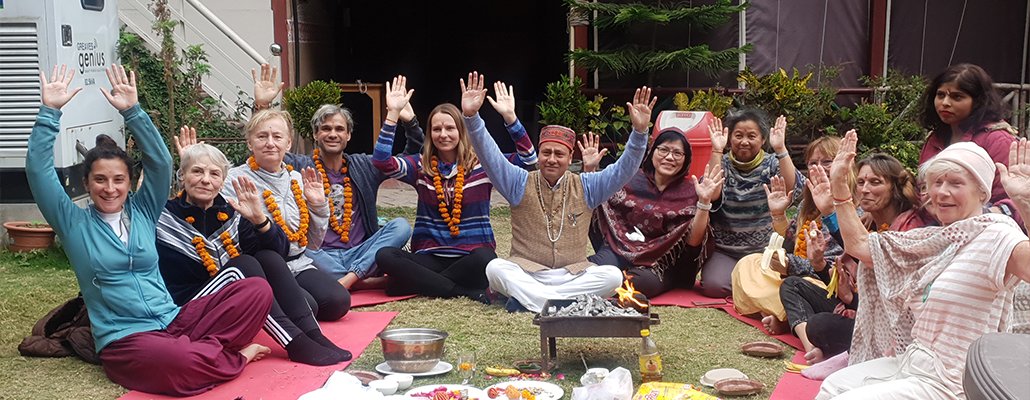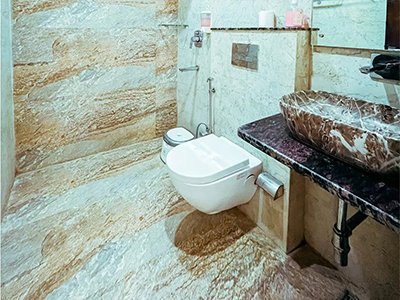200 Hour Ayurveda & Yoga Teacher Training in Rishikesh, India
Embark on a transformative journey with our 200 Hour Ayurveda and Yoga Teacher Training in Rishikesh. This comprehensive program is designed to immerse you deeply in the ancient sciences of Ayurveda and Yoga, fostering not only personal growth but also preparing you to teach and inspire others. Set in the serene and spiritual surroundings of Rishikesh, often referred to as the 'Yoga Capital of the World', our course offers a unique blend of theoretical knowledge and practical experience.
Our curriculum covers a wide range of topics including the fundamentals of Ayurveda, the principles of yoga philosophy, anatomy and physiology, teaching methodology, and the practice of various yoga asanas. You will learn about the doshas (body types), the properties of different herbs and foods, Ayurvedic nutrition, and lifestyle practices for health and wellness. Additionally, the course includes in-depth sessions on pranayama (breath control), and the art of sequencing yoga classes.
Under the guidance of experienced teachers, you will explore the synergies between Ayurveda and Yoga, enabling you to create holistic wellness plans that integrate both disciplines. Our training not only equips you with the skills to teach confidently in any setting but also deepens your own practice and understanding of these ancient wisdom traditions.
Upon completion of the course, you will receive a certification that qualifies you to teach Ayurveda and Yoga worldwide, according to the standards of the Yoga Alliance. Whether you are looking to start a new career, enhance your existing yoga teaching skills, or simply deepen your personal practice, our 200 Hour Ayurveda and Yoga Teacher Training in Rishikesh offers a life-enriching experience that paves the way for a journey of health, harmony, and self-discovery.
Curriculum for 200 Hour Ayurveda TTC
Techniques, Training & Practice
- Doshas: Understanding the three doshas - Vata, Pitta, and Kapha - which are believed to be the fundamental principles of the human body.
- Diet and Nutrition: Understanding the importance of a balanced diet and the use of food as medicine.
- Herbs and Spices: Understanding the use of herbs and spices in Ayurvedic medicine for their therapeutic benefits.
- Ayurvedic Treatments: Understanding the various Ayurvedic treatments such as Panchakarma, Ayurvedic massage, and Shirodhara.
- Yoga: Understanding the role of yoga in Ayurveda for promoting health and well-being.
- Lifestyle: Understanding the importance of a healthy lifestyle, including sleep, exercise, and daily routine.
- Diagnosis: Understanding the Ayurvedic approach to diagnosis, including pulse diagnosis, tongue diagnosis, and observation of physical symptoms.
- Ayurvedic Psychology: Understanding the relationship between the mind and body and the use of Ayurvedic practices to promote mental health and emotional well-being.
- Ayurvedic Pediatrics: Understanding the use of Ayurveda in the treatment and prevention of childhood illnesses.
- Historical contexts of hatha yoga
- Surya Namaskar (Sun Salutation)
- Chandra Namaskar (Moon Salutation)
- Pawan Muktasana series A, B, C
- Asanas (Postures)
- Standing Asanas
- Vajrasana Group of Asanas
- Backward Bending Asanas
- Forward Bending Asanas
- Spinal Twisting Asanas
- Balancing Asanas
- Inverted Asanas
- Relaxation Asanas
- Sequences
- Standing Sequence
- Kneeling Sequence
- Sitting Sequence
- Pronation Sequence
- Supination Sequence
- Inversion Sequence
- Twisting Sequence
- Hip-Opening Sequence
- Forward Bending Sequence
- Back Bending Sequence
- Mantra Practice with their meaning
- Ganesh Mantra
- Mahāmṛtyunjaya Mantra
- Invocation to Guru
- Shanti (Peace) Mantras
- Pranayama Mantra
- Universal Peace Mantra
- Invocation to Patanjali
- Hare Krishna Maha Mantra
- Aspects of Yoga Alignment
- Various Principles of Hands-Adjustments
- Practical lessons on Alignments & Adjustment of various Asanas
- Historical contexts of pranayama & subtle body.
- Understanding of pranayama effects on your body.
- Four Aspects of Pranayama
- The Pranic Body
- Five Major Pranas & Five Minor Pranas
- Nadis - Channels of Prana
- Ida Pingala and Sushumna
- Location of the Nadis
- Basic Understanding of Chakras
- Different Types of Pranayama Practices
- Abdominal (or diaphragmatic) breathing
- Thoracic Breathing
- Clavicular Breathing
- Yogic Breathing
- Nadi Shodhana Pranayama/ Alternate Nostril Breathing
- Sheetali Pranayama/ Cooling Breath
- Sheetkari Pranayama
- Bhramari Pranayama
- Ujjayi Breathing
- Bhastrika Pranayama
- Kapalbhati Pranayama/ Frontal brain cleansing breath
- Surya Bhedi Pranayama
- Chandra Bhedi Pranayama
- History and philosophy of meditation.
- What is Meditation
- Preparation for Meditation
- Asanas for Meditation
- Mudra & Bandhas for Meditation
- Different Types of Meditation Practices
- Mantra Meditation
- Guided Meditation
- Mindfulness Meditation
- Loving Kindness Meditation
- Inner Silence Meditation
- Progressive Muscle Relaxation Meditation
- Art Meditation
- Breath Awareness Meditation
- Emotional Awareness Meditation
- Raisin Meditation
- Trataka Meditation
- Chakra Meditation
- Yoga Nidra
- Mudras (Hand Gestures)
- Five Element Theory
- Jnana Mudra (Psychic Gesture of Knowledge)
- Chin Mudra (Psychic Gesture of Consciousness)
- Hridaya Mudra (Heart Gesture)
- Shoonya Mudra (Gesture of Emptiness)
- Apan Mudra (Digestion Gesture)
- Prana Mudra (Invocation of energy)
- Vayu Mudra (Gesture of Air)
- Prithvi Mudra (Gesture of Earth)
- Buddhi Mudra (Gesture of Intellect)
- Bandhas (Energy Lock)
- Jalandhara Bandha (throat lock)
- Moola Bandha (perineum contraction)
- Uddiyana Bandha (abdominal contraction)
- Maha Bandha (the great lock)
- Jalaneti
- Rubber neti
- Netra Shudhi (Eye cleansing)
Anatomy & Physiology
- Anatomy & Physiology
- Levels of structural complexities
- Skeletal System
- Muscular System
- Nervous System
- Endocrine System
- Respiratory System
- Cardiovascular System
- Digestive System
- Biomechanics
- Force
- Joint Movements
- Safe Movements
Yoga Humanities
- History of Yoga
- Origination & Meaning of Yoga
- Different type of Yoga
- Gyana Yoga, Karma Yoga, Bhakti Yoga, Hatha Yoga, Raja Yoga
- The Eight Limbs of Yoga
- Understanding of Patanjali Yoga Sutras
- Understanding Bhagavad Gita
Professional Essentials
- Sequencing
- Pace
- Environment & ambiance of a yoga class
- Yoga Cues
- Teaching/guiding a yoga class
- Command over teaching yoga
- Essential skills for teaching a yoga class
- Mentoring and feedback
Accommodation
Total Course Fee (Including Room & Food)
Private Room
1400 USD
2-Shared Room
1100 USD
3-Shared Room
900 USD
4-Shared Dorm
800 USD
What is included ?
- Ayurveda & Yoga Classes
- Yoga Mat, blocks, Shatkarma kit
- Food
- Kirtan Session
- Sound healing session
- Full moon/ New moon ritual
- Books & Manual
- Accommodation
- Excursions
- Acro Yoga session
- De-stress throgh fun
Daily Schedule
| Time | Session |
|---|---|
| 05:30 AM - 06:00 AM | Morning Bell |
| 06:00 AM - 07:30 AM | Hatha Yoga |
| 07:40 AM - 08:30 AM | Pranayama |
| 09:00 AM - 09:45 AM | Breakfast |
| 11:00 AM - 12:00 AM | Yoga Philosophy / Ethics |
| 12:00 AM - 13:00 PM | Alignment / Teaching Methodology |
| 13:15 PM - 13:45 PM | Lunch |
| 15:00 PM - 15:50 PM | Anatomy Physiology & Biomechanics |
| 16:00 PM - 17:00 PM | Ayurveda |
| 17:40 PM - 18:30 PM | Meditation / Mantra Chanting |
| 19:00 PM - 19:45 PM | Dinner |
Note : The daily schedule may be subject to changes by the teachers.








